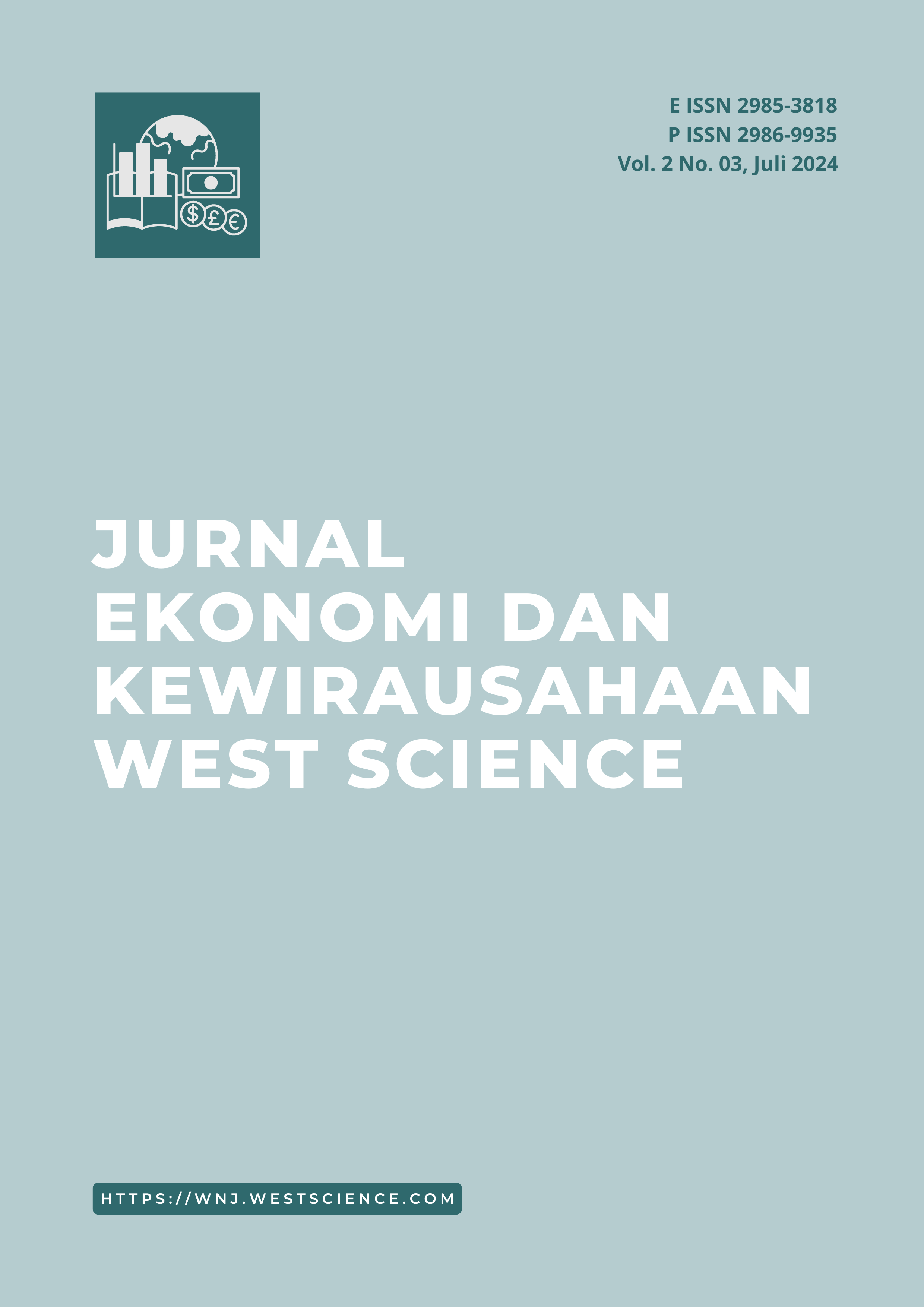Dampak Fintech Lending terhadap Industri Perbankan
DOI:
https://doi.org/10.58812/jekws.v2i03.1433Kata Kunci:
Fintech Lending, Industri Perbankan, Bibliometrik, Peer-to-Peer Lending, VOSviewerAbstrak
Penelitian ini menganalisis lanskap penelitian fintech lending dan industri perbankan melalui pendekatan bibliometrik. Klasterisasi tema mengidentifikasi empat klaster utama: fintech lender dan kredit, peer-to-peer lending, teknologi keuangan, dan fintech syariah, yang menunjukkan fokus pada berbagai aspek fintech lending. Tren penelitian dari tahun 2020 hingga 2022 menunjukkan evolusi topik dengan peningkatan perhatian terhadap teknologi keuangan dan fintech syariah. Peluang penelitian ditemukan dalam area dengan densitas rendah seperti perlindungan hukum, literasi keuangan, ekosistem fintech, dan pinjaman digital untuk UKM, menawarkan ruang eksplorasi lebih lanjut untuk inovasi dan pertumbuhan berkelanjutan. Analisis kolaborasi penulis menunjukkan variasi dalam intensitas dan pendekatan metodologis, dengan peluang untuk memperluas kolaborasi lintas klaster dan institusi guna memperkaya penelitian dan menghasilkan dampak yang lebih besar.
Referensi
Anagnostopoulos, I. (2018). Fintech and regtech: Impact on regulators and banks. Journal of Economics and Business, 100, 7–25.
Bartlett, R., Morse, A., Stanton, R., & Wallace, N. (2022). Consumer-lending discrimination in the FinTech era. Journal of Financial Economics, 143(1), 30–56.
Buchak, G., Matvos, G., Piskorski, T., & Seru, A. (2018). Fintech, regulatory arbitrage, and the rise of shadow banks. Journal of Financial Economics, 130(3), 453–483.
Chen, M. A., Wu, Q., & Yang, B. (2019). How valuable is FinTech innovation? The Review of Financial Studies, 32(5), 2062–2106.
Fuster, A., Plosser, M., Schnabl, P., & Vickery, J. (2019). The role of technology in mortgage lending. The Review of Financial Studies, 32(5), 1854–1899.
Goel, I. (2024). FINANCIAL EDUCATION AND DIGITALISATION: ANALYSIS OF AVENUES. Sachetas, 3(1), 17–25.
Gomber, P., Kauffman, R. J., Parker, C., & Weber, B. W. (2018). On the fintech revolution: Interpreting the forces of innovation, disruption, and transformation in financial services. Journal of Management Information Systems, 35(1), 220–265.
Herzenstein, M., Sonenshein, S., & Dholakia, U. M. (2011). Tell me a good story and I may lend you money: The role of narratives in peer-to-peer lending decisions. Journal of Marketing Research, 48(SPL), S138–S149.
Jagtiani, J., & Lemieux, C. (2018). Do fintech lenders penetrate areas that are underserved by traditional banks? Journal of Economics and Business, 100, 43–54.
Lee, I., & Shin, Y. J. (2018). Fintech: Ecosystem, business models, investment decisions, and challenges. Business Horizons, 61(1), 35–46.
Lin, H., Chen, C., Chiu, Y., & Lin, T. (2022). How financial technology (fintech) can improve the business performance of securities firms by using the dynamic data envelopment analysis modified model. Managerial and Decision Economics, 43(4), 1113–1132.
Millaningtyas, R., Amin, M., Hermawan, A., & Handayati, P. (2024). Digital Transformation of Financial Literacy and Inclusion as a Support for Convenience for MSMEs. International Journal Of Humanities Education and Social Sciences, 3(5).
Naumenkova, S., Mishchenko, S., & Dorofeiev, D. (2019). Digital financial inclusion: Evidence from Ukraine. Investment Management & Financial Innovations, 16(3), 194.
Nnaomah, U. I., Aderemi, S., Olutimehin, D. O., Orieno, O. H., & Ogundipe, D. O. (2024). Digital banking and financial inclusion: a review of practices in the USA and Nigeria. Finance & Accounting Research Journal, 6(3), 463–490.
Okello Candiya Bongomin, G., Akol Malinga, C., Manzi Amani, A., & Balinda, R. (2024). Recalibrating the scope of financial inclusion through financial technologies in the digital age: the role of digital literacy as a moderator in rural Uganda. Information Technology & People.
Prykaziuk, N., & Khodakivska, Y. (2023). DIGITAL FINANCIAL LITERACY: COMPONENTS AND METHODS OF ENHANCEMENT. Innovation and Sustainability, 31–37. https://doi.org/10.31649/ins.2023.2.31.37
Qiang, X. (2024). Digital Transformation in the Financial Sector Through Fintech. Advances in Economics, Management and Political Sciences, 76, 226–234. https://doi.org/10.54254/2754-1169/76/20241656
S, G. K., & Kalaiselvi, D. S. (2023). Impact of Fintech Innovations- Expanding Access and Empowering Communities. International Journal For Multidisciplinary Research, 5(5), 1–8. https://doi.org/10.36948/ijfmr.2023.v05i05.7518
Sinha, A. (2023). Digital Technology Improving Financial Inclusion in India: Post Covid Evidence. ICAEF Conference.
Sriyono, S., Andjani, S., & Irawan, M. F. (2023). Evaluation of Fintech’s Impact on Financial Inclusion in Indonesia: A Case Research on the Use of Digital Payment Services. The Management Journal of Binaniaga, 8(2), 91–102.
Sun, D., Yang, X., Liu, M.-Y., & Kautz, J. (2018). Pwc-net: Cnns for optical flow using pyramid, warping, and cost volume. Proceedings of the IEEE Conference on Computer Vision and Pattern Recognition, 8934–8943.
Suryono, R. R. (2019). Financial technology (fintech) dalam perspektif aksiologi. Masy. Telemat. Dan Inf. J. Penelit. Teknol. Inf. Dan Komun, 10(1), 52.
Thakor, A. V. (2020). Fintech and banking: What do we know? Journal of Financial Intermediation, 41, 100833.
Tretyakova, I. N., Belousova, L. S., & Svezhentseva, K. I. (2024). Digitalization As a Modern Trend in the Management Contour of the Financial Sector. Proceedings of the Southwest State University. Series: Economics. Sociology. Management, 14(1), 189–199. https://doi.org/10.21869/2223-1552-2024-14-1-189-199
Vives, X., & Ye, Z. (2022). Fintech Entry, Lending Market Competition and Welfare. Working Paper IESE Business School, July 14.
Wanof, M. I. (2023). Digital technology innovation in improving financial access for low-income communities. Technology and Society Perspectives (TACIT), 1(1), 26–34.
Yuneline, M. H., & Rosanti, M. F. C. (2023). The Role of Digital Finance, Financial Literacy, and Lifestyle on Financial Behaviour. HOLISTICA–Journal of Business and Public Administration, 14(2), 97–115.
Zalan, T., & Toufaily, E. (2017). The promise of fintech in emerging markets: Not as disruptive. Contemporary Economics, 11(4), 415.
Zeynalov, Z. (2023). THE IMPACT OF DIGITAL PAYMENTS ON THE GROWTH OF CASHLESS PAYMENTS AND THE FACTORS LIMITING ACCESS TO FINANCIAL SERVICES. Agora International Journal of Economical Sciences, 17(2), 181–186.
Unduhan
Diterbitkan
Cara Mengutip
Terbitan
Bagian
Lisensi
Hak Cipta (c) 2024 Loso Judijanto, Eko Sudarmanto, Sitti Ramelan Chadidjah

Artikel ini berlisensiCreative Commons Attribution-ShareAlike 4.0 International License.



















 Instagram
Instagram 